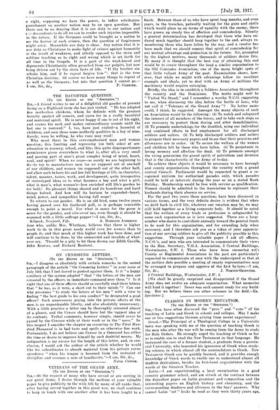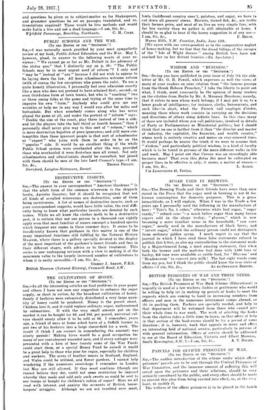• CLASSICS IN MODERN EDUCATION.
[To rim EDITOR or roe " Elrecrarea".1
Sia.—You have often discussed the "pros" and " eons " of the teaching of Latin and Greek in schools and colleges. May I make one or two suggestions thereon arising from recent experiences?
Greek.—The Principal of a Theological College in a University town was speaking with me of the question of teaching Greek to the men who after the war will be coming from the Army to study for Holy Orders. He strongly urged the teaching of Greek so far as to enable one to read the New Testament in that language. He instanced the case of a former student, a graduate from a provin- cial University, who lamented his ignorance of Greek when study- ing science, in which almost all the nomenclature is Greek. New Teatament Greek can be quickly learnsal, and it provides enough knowledge of Greek words to enable one to understand almost all modern derivations, besides its first-hand acquaintance with the words of the Greatest Teacher.
Latin.—I am superintending a local examination in a good country grammar school, and am struck at the contrast between the dryasdust paper on Latin grammar and composition and the interesting papers on English history and chemistry, and the corresponding deadness and aliveness in the boys' answers. Why cannot Latin "set " becks be read as they were thirty yearn ago, and questions be given as to subject-matter as for Shakespeare. and grammar questions be set on passages translated, and re- translations required? These would be live methods and would make Latin a live and not a dead language.—I am, Sir, Ste.,
Whitfield Parsonage, Brackley, Northants. C. H. Cotes.



































 Previous page
Previous page